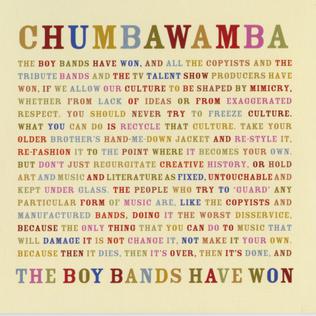
Album cover of Chumbawamba’s 2008 album.
During the 60th Grammy Awards held on Sunday, January 28th, 2018, Trump’s United Nations Ambassador Nikki Haley tweeted the following: “I have always loved the Grammys but to have artists read the Fire and Fury book killed it. Don’t ruin great music with trash. Some of us love music without the politics thrown in it.”
The idea of keeping politics out of music is not a new sentiment. For example, leading up to the 2017 Super Bowl halftime show their were those that expressed concerns about the possibility that Lady GaGa would use her platform to make a political statement. She did in subtle ways which included the juxtaposing of Irving Berlin’s “God Bless America” with Woody Guthrie’s “This Land Is Your Land”. But since the average viewer isn’t familiar with the fact that Guthrie’s pro-open border classic was written in protest to Berlin’s tune, many wouldn’t have clued into the political implications. Right leaning individuals were able to watch the halftime show without their football being ruined by politics.
Haley’s view that music and politics should be kept separate also loses sight of the fact that politics and music always went hand in hand. Of course there are the songs that are obvious protest tunes, but quite often the politics are less obvious. For example, in response to the songs that he composed for Mavis Staple’s 2017 album, If All I Was Was Black (which one of the best protest albums of 2017), Jeff Tweedy made the following statement: “I’ve always thought of art as a political statement in and of itself—that it was enough to be on the side of creation and not destruction.” But he also went on to explain why musicians might be motivated to become more explicit with their political views, “But there is something that feels complicit at this moment in time about not facing what is happening in this country head on.” Songs are a means that singer-songwriters use to try to make sense of the world we’re living in.
Also reflecting on Haley’s comments and why singer-songwriters are motivated to sing about politics, made me think of “Sing About Love” by Chumbawamba, who are primarily known for their 1997 hit “Tubthumping”. Prior to becoming one hit wonders, the band was slogging away since the early 80s making music that reflected the political realities of what was going on in their native UK. After their sole hit, they continued to solider on in obscurity right up to their disbanding in 2012.
“Sing About Love” expresses a desire to live in a world where a singer wouldn’t have to write and sing songs about political upheavals. But until that world exists, Chumbawamba will “sing them, and sing them, ’til there’s no need to sing them”.
“Sing About Love” appears on the band’s 2008 album The Boy Bands Have Won (full title contains 865 characters and at the time of this writing appears to hold the world record for longest album title).